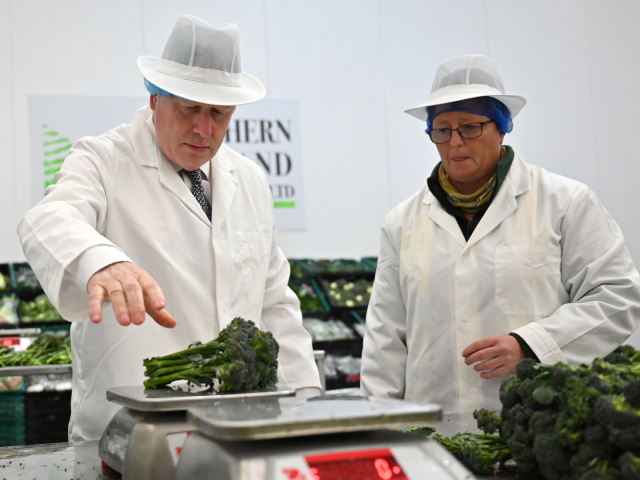The United Kingdom is planning to make a modest use of its newfound post-Brexit powers to cut import tariffs on foods produced in foreign countries to ease the cost of living crisis, the Prime Minister has said.
Food products that the UK does not produce domestically, such as banans, olives, oranges, and rice may have their prices reduced on the shelves as the government looks to scrap tariffs that were held over from when the UK was still in the EU.
Speaking from the NATO meeting in Madrid, Spain, Boris Johnson said that there are many “food tariffs we don’t need,” announcing that the government has launched a review on which import taxes could be lifted to ease the cost of living crisis without impacting British farmers.
In comments reported by The Times of London, Mr Johnson said that among leading economies “there’s a new impetus to cut food tariffs — [there are] $750 billion worth of food tariffs around the world.”
“We’ve got food tariffs we don’t need … do we in the UK need to have tariffs on oranges? We don’t grow many bananas in the UK,” Johnson added.
The paper reported that the PM had first floated the notion of cutting food tariffs at a recent meeting of his cabinet in which he called on government ministers to come up with solutions to the growing cost of living crisis, which is only expected to get worse, with predictions of 11 per cent inflation by October.
When pressed on whether he believed the economic situation would continue to worsen, Johnson replied: “I wouldn’t want to put it in exactly that way, but what I would say is that it’s going to continue to be an issue.”
Others have been starker in their predictions, including the head of the Bank of England, Andrew Bailey, who warned that the UK may experience a longer period of inflation than other top economies.
Speaking at a conference of central bankers in Portugal, Bailey said: “I think the UK economy is probably weakening rather earlier and somewhat more than others.”
The Bank of England chief said that the Chinese coronavirus crisis has left a “structural legacy” in the British economy, in which employers are still struggling to find employees and inflation has been exacerbated by global supply chain issues.
Warning of potentially raising interest rates again, the central banker said: “There will be circumstances in which we will have to do more. We’re not there yet in terms of the next meeting. We’re still a month away, but that’s on the table. But you shouldn’t assume it’s the only thing on the table – that’s the key point.”
Whether the cuts to food tariffs will have a meaningful impact on food prices at the shop for British consumers remains to be seen, with International Trade Secretary Anne-Marie Trevelyan noting that the plan was legally complex and may only have a “tiny” impact on grocery prices.
However, the move from the government to examine the issue is notable in that it marks the first major instance in which the British government is looking to use post-Brexit freedoms to benefit the consumer.
After leaving the European Union, the government kept in place many of the tariffs set in place by the bloc, with the exception of goods covered in trade deals that have been struck since Brexit.
Many of the tariffs were set in place to protect the domestic products of member states. For example, there is a 12 per cent tariff on oranges from outside the EU still on the books in Britain, as the bloc imposed the tax in order to protect producers in Spain.
The question going forward will be to determine if cutting such a tariff will be cheaper than importing oranges from the EU, which Britain currently has tariff-free trade with, as the shipping costs from other foreign countries may outweigh the potential gains of cutting the import tax. Nevertheless, simply abolishing taxes will allow the market to decide without government input.
It is also notable that tariffs apply to wholesale prices rather than the price at which they are sold to consumers, and therefore potential savings may not necessarily be passed on to the consumer. However, should the policy be extended to other areas and other countries which the UK currently does not have trade deals with, prices overall could begin to drop.
Follow Kurt Zindulka on Twitter here @KurtZindulka

COMMENTS
Please let us know if you're having issues with commenting.